A Handmade Legacy
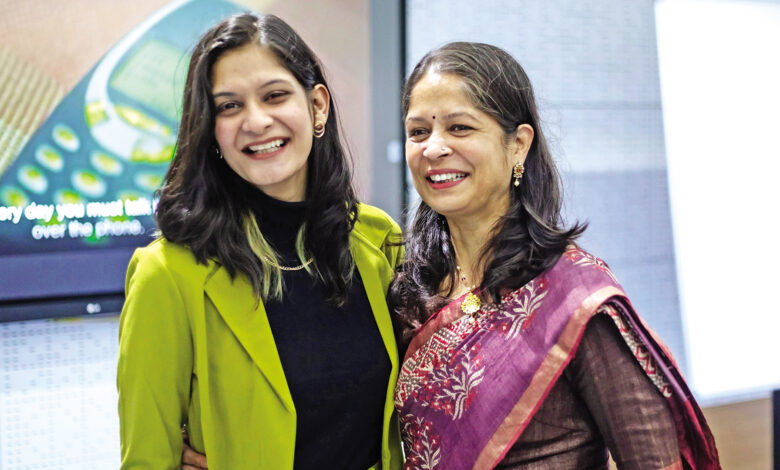
The story of Ekatra is literally all about women, handmade arts, a profound impact, and a legacy created by the mother and daughter duo, Minakshi and Aishwarya Jhawar. Kasturi Pathak finds out the impact of bringing women with unexplored potential together, the beauty of handmade pieces and why the success of Ekatra is inspiring
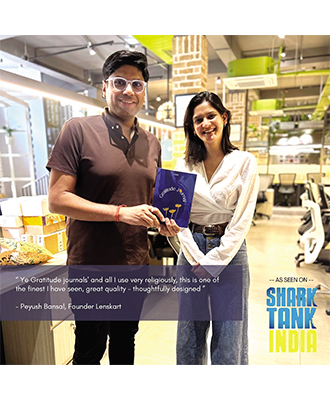
It’s no secret that a woman has a special corner in her heart dedicated to her mother. Some girls find a close friend in their mothers. Some find their guide, and their role model. Aishwarya Jhawar found a co-founder in her mother Minakshi Jhawar, who stands by her side in her entrepreneurial journey! The duo founded Ekatra Handmade in Kota, Rajasthan before the COVID-19 hit. Gradually, their work started getting organic recognition. Ekatra’s fame and impact rose to new heights when it received funding at Shark Tank India – Season 2.
“She is the mother who nags me for breakfast, lunch, and everything else. In the office, she is the boss lady with a to-do list on her mind, getting things done and managing the team,” says Aishwarya. Initially, Aishwarya did not see Ekatra as a start-up and Shark Tank was not on the cards. She was sceptical, but with a push from her mother, they could do it together.
Bonding over nature
Ekatra has some products made from agricultural waste and bamboo, and a project that upcycles textile waste. Ekatra also believes in connecting people to nature and inspiring self-reflection. “A product is not merely for the consumer―it has led another lifetime before it reaches the consumer’s hands. It has generated livelihoods and in a case like Ekatra, imparted the joy of making,” says Aishwarya.
Connecting lives
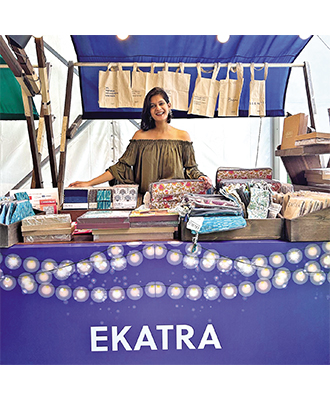
With the urge to unleash their potential, the two founded Ekatra. The brand’s exquisite stationery and paper goods personally connect to the users reflecting her deep knowledge and education in designing. The brand has become a source of employment for many women. For instance, Nilima, a resident of Kota lost her husband during the OVID19 pandemic. Nilima needed work to sustain herself and her family when Ekatra came to her rescue. It is not only the employment opportunities for women, but at Ekatra, the founders ensure to provide a safe space for employees to talk about their problems.
Empowering women
For centuries women have been the secondary individuals in households as well as in society. Several reasons come on their way to dream and contribute to their family financially. However, families, especially in rural areas, are slowly but steadily opening to the women in the household seeking jobs and contributing to the family’s income. In some rural areas around Pune, homemaker women spend their time watching TV and browsing on YouTube or Instagram after finishing their chores for the day – including cooking, cleaning and tending to the household. When someone willing to offer a job enters the village, they jump at it. It is a chance to be more productive, and more importantly, support their children’s education and secure their future to the best of their abilities.
It is not only the employment opportunities, but at Ekatra, the founders ensure to provide a safe space for employees to talk about their problems
Creating a better future
Similar to Ekatra, a Pune-based organisation, Poornam Ecovision Foundation, upskills and employs women to upcycle old textiles. They observed that women face many difficulties travelling to their workplaces after finishing their chores at home, dropping off their kids at school, and whatnot. The job needs to go to them. They eventually started employing women to stitch and sew, sitting at home. They half-stitch the bags into which the textiles need to be upcycled, from the comfort of their home. The products are brought to Poornam’s office, where the halfstitched products meet finesse.
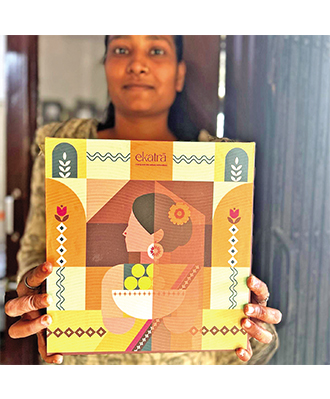
Handmade in the 21st century
The success of several domestic ventures is also because of a rising demand for handmade products across the world. The aura around a handmade product has a distinct personality – a product is often more special when someone has spent time crafting it with their own hands. There is an emotion associated with every detail, including the flaws. Just like how the food cooked by mother is not only delicious but nourishes the family at the same time, the craft maker’s emotions are transmitted to the product they are creating. It is this effort that often demands a higher price for handmade goods, experts believe. It is challenging to upscale the production of handmade goods. Without scale, it is difficult to compete with factory-made goods, especially in a price-sensitive market like India. However, with the increase in disposable income and growing awareness about the ethicality of handmade goods, this popularity is growing.
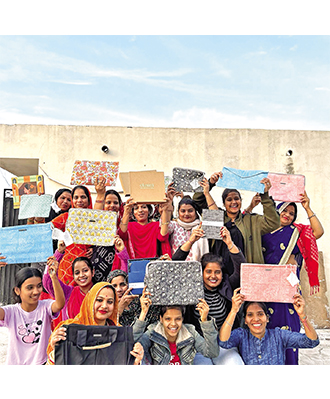
Sustainable India
Handicrafts and India have a deep-rooted connection. First-world countries are especially willing to spend on handmade articles and pay that premium – maybe they have realised the value in the “limited-edition” stock and the uniqueness of the products. A lot of sustainable products, which are mistaken to be high-end or luxury products because of their pricing, tend to get exported from India.
A product is not merely for the consumer―it has led another lifetime before it reaches the consumer’s hands. It has generated livelihoods and in a case like Ekatra, imparted the joy of making
The joy of making
Creating something with your hands activates different areas of the brain; it exercises brain muscles that are not actively used in our daily lifestyle. The textures of the materials, the scent of wood or of paper, the feel of paint, the scope for imagination offered by different prints and patterns on cloth, boost creativity and is a haven for anybody who appreciates art and is seeking inspiration! The makers are experiencing this joy, what if it could be imparted to customers, too?

